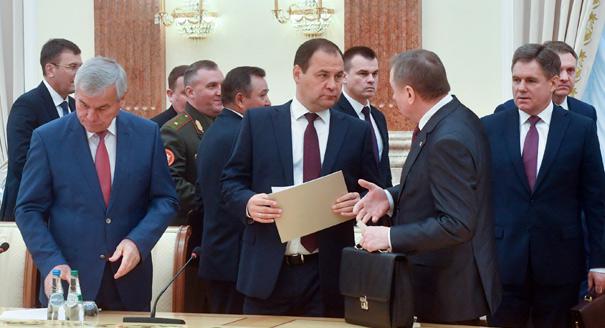Two months ahead of Belarus’s presidential election, as opposition candidates cultivate a political activity long unseen in the country, President Alexander Lukashenko has replaced his prime minister and reshuffled his Council of Ministers. Gone are those who were considered proponents of reform, while the number of officials with ties to the security services has increased, revealing the Belarusian leadership’s plan for overcoming the current pre-election instability and economic crisis.
The outgoing government ministers include Prime Minister Sergei Rumas, Deputy Prime Minister Dmitry Krutoy, and Finance Minister Maxim Yermolovich, all of whom had been called liberals, though it is more accurate to describe them as technocrat-monetarists.
Together with the central bank, they opposed pouring money into the economy and propping up the inefficient state sector, instead proposing market reforms and strict monetary policy. They were not permitted to carry out any significant reforms, but nor did they allow any drastic backsliding to top-down dirigisme.
The departure of these three men is a significant loss to the reform-minded bloc of the government, but it can hardly be described as a complete rout. While Yermolovich and Krutoy’s successors are men with similar views to their predecessors, the same cannot be said of Rumas’s replacement. The new prime minister, Roman Golovchenko, is a career silovik who has served in the Security Council, Prosecutor General’s Office, and presidential administration. For the last ten years, he has worked in the arms sector.
Golovchenko’s last job was head of the State Military-Industrial Committee. Before that, he was ambassador to the Gulf countries: one of the main markets for Belarusian arms exports, making it a position that requires the president’s complete trust. People in the know describe Golovchenko not as a hardliner, but more as an efficient manager from the military sector.
Several other ministers were also replaced, apparently as part of a standard reshuffle. Still, both liberal observers within the country and Belarus’s Western partners, who had held out hope for market reform from above and Singapore/South Korean-style authoritarian modernization, have seen those hopes dashed. The last few years have shown that the government is nothing more than an administrator of presidential decisions.
So why now? Lukashenko answered this question himself. “Right now is not a time to dismantle anything. It’s not even a time to build. Today we must save that which has already been built.” This is primarily a reaction to the economic crisis that began before the pandemic, but worsened with its arrival.
For Lukashenko, the current crisis is a time for mobilization. What’s needed is not experiments but discipline: preferably military, hence the choice of new prime minister.
The mobilization trend in government goes back to at least the end of last year, when two harmless opposition deputies were removed from parliament, and a man with a KGB background, Igor Sergeenko, was made head of the presidential administration.
The latest government reshuffle strengthens the control of the siloviki over all key Belarusian institutions of power. However, it’s worth noting that the country’s siloviki are not a tight-knit caste but more of a conglomerate of competing groups. Still, receiving dossiers that increasingly resemble military reports is bound to influence Lukashenko’s decisionmaking.
It’s not yet clear how the new government’s goals will differ from its predecessor’s. With the departure of the team responsible for negotiating loans from the IMF and other Western institutions, that process could be put on hold.
Given the protracted crisis in its relationship with Russia, Belarus will have to look for money and new partners elsewhere. This is where Golovchenko’s past as ambassador to Gulf nations may prove useful. Meanwhile, nearly all the people involved in talks on closer integration with Russia last year have left the government. This means there is no one in the cabinet who attaches any particular value to that initiative.
Many observers have rushed to connect the government reshuffle with Lukashenko’s reelection campaign, but that’s only partly true. It’s true that mass protests in Minsk and the regions have infuriated Lukashenko, who denies that there is a new protest movement. But the protests and unexpected rival candidacies from two members of the elite—banker Viktor Babariko and former presidential aide Valery Tsepkalo—are not so much the cause of the reshuffle as the background to it.
Neither the new prime minister nor the new ministers will have much to do with politics: in the Belarusian system, that’s quite simply not what they’re there to do. For that, Lukashenko has his administration and the siloviki, with whose work he is currently satisfied. Indeed, they are demonstrating their usefulness right now, by arresting protesters across the country.
The discernible pre-election politicization of Belarusian society is merely a symptom of the problem that caused Lukashenko to appoint the new government. That problem is that the long-serving president has ceased to offer society a positive agenda for development, and is forced to fall back on a defensive one.
Lukashenko’s entire election campaign has consisted of attempts to convince the Belarusian public and nomenclature of the existence of dangerous threats from which he personally is saving the country. Even as he appointed the new government, he decided to remind “some who had forgotten” how former Uzbek president Islam Karimov brutally suppressed an uprising in Andijan, leaving several hundred dead, and how Tajik President Emomali Rahmon took the country’s capital Dushanbe by storm “with rows of machine guns.”
Whether or not Lukashenko actually believes such scenarios are possible in Belarus, in this situation he needs a wartime cabinet. Yet the steep economic downturn, increased influence of the siloviki, pre-election repression, and doubts over the loyalty of officials are not the most favorable backdrop for his reelection. It’s not entirely clear what resources, other than force, Lukashenko plans to rely on for his sixth presidential term.
